“The Creek Nation was once one of the largest and most powerful Indian groups in the Southeast.” Much of their land was lost as the federal government sought land for white settlement after the American Revolution, through cessions, treaties and other arrangements between Chiefs and agents of the federal government.
William McIntosh (Alabama Department of Archives and History)
Opposition to land cession
After the first Creek-Indian War, Creeks began moving from Alabama after William McIntosh signed the Treaty of Indian Springs which ceded all the Lower Creek land in Georgia and a large tract of land in Alabama to the United States. “Most Creeks were overwhelmingly opposed to the land cession, and the sale of land without the approval of the Creek National Council was punishable by death under Creek law. Thus, in May 1825 McIntosh was executed at one of his plantations on the Chattahoochee River McIntosh and his followers received $200,000 and land in present-day Oklahoma.”1 A delegation of Creeks traveled to Washington, D. C. and were successful in having the treaty nullified. In late 1827, followers of William McIntosh began emigrating to Fort Gibson in Oklahoma and many more voluntary emigrations followed.
Troubles continued between the whites and the Creeks as plantations were looted and destroyed in the Alabama counties of Chambers, Macon, Pike, Lee, Russell, and Barbour. This erupted into a 2nd Creek War in 1836. The violence provided President Andrew Jackson with justification for removing all the Creeks from Alabama.
Below are some transcriptions of Alabama newspaper articles of stories about their journey in 1837.
Transcriptions from the Jacksonville Republican, Calhoun County, Alabama, February 1837
Indian Diturbances (sic)
Uchee, Alabama, Jan. 8, 1837
Messrs. Editors of the Enquirer:
The citizens of Russell county, Alabama have held a public meeting in consequence of the late murder and burning that took place at Dr. Battle’s plantation at which they adopted resolutions requesting Capt. Page, the Indian Agent to remove to some convenient point on the western limits of the Creek nation so called all the Indians still remaining within their former territory.
This measure the citizens think is absolutely necessary for their own preservation; as well as for the personal safety of the Indians themselves. All, or nearly all, of those warriors, who had been friendly during the late war, are either gone to Arkansaw (sic) or to Florida; and a majority of those capable of bearing arms now in the several camps have come in subsequently and are uncontrolable (sic) sometimes in camp, but most frequently out, prowling about the country, and well armed. It is believed that such are the Indians who committed the recent outrages at Dr. Battles. They must be disarmed, and if a military force is necessary to effect this object, the nearer the Indians are encamped to those who shall be called to board them, the less inconvenience will be felt by the soldiery thus employed. Besides, the Government Agents for investigating land transactions are resident int that quarter, with whom they may have business, and by considering all the camps, there would be less visiting and revisiting among them; during which visits not unfrequently (sic) happens that a horse is stolen or other theft committed. The citizens from the zeal and industry hither to manifested by Capt. Page in Indian affairs. and his known urbanity (?) and accommodating disposition have sanguin (sic) hopes that their wishes in this particular will be duly considered. It will be seen however by the 4th resolution, that the citizens think of not being trampled upon much longer. The time is fast approaching when their duty….. (rest of page torn)
Letter from the Arkansas Gazertte
Port Gibson – Dec. 10, 1836
My Dear Sir:
Ye-poth-la-ho-lo has arrived at this place and there is to be no war nor rumors of war. The two chieftains, Ye-poth-le-ho-lo and Rolly McIntosh, with their principal men, met yesterday―all was pacific. The pipe of peace was puffed, and a glass of old rye (perhaps new corn) kindly drank by all to commemimorate (sic) their union. The emigrating people will remain here until all the stragglers have arrive, [8 or 10 gangs] when they will separate and select for themselves, each their favorate (sic) portions of their new country and occupy it without a murmur―unless there should be a deficiency in the supplies promised them by the Government, which I do not anticipate.
We expect the first Regiment of Arkansas volunteers here in a few days. They will necessarily be compelled to occupy tents during their stay, which will be until the expiration of their term of service (6 months.) The companies now at this place appear quite at home; in fact, I think they would be satisfied for much longer time than their present term of service, particularly the officers, many of whom are very clever fellows; and I feel particularly gratified that the officers of the regular army at this post, treat them with much attention.”
————-
Little Rock, Ark. Dec. 20
John Ross, the celebrated Indian Chief has been for several weeks past, among the western Cherokees, for the purpose it is said, of getting up a delegation from them to join the delegation from Georgia, to proceed to Washington City, for the purpose of inducing the government to renounce Schemerhorn’s Treaty to which it is averred they never gave their consent. ―Gazette
Chief John Ross (Alabama Department of Archives and History)
Tuck-e-batch-I-had-jo, with his body of Creeks, 2 or 3000 strong has stopped above Potts, it is said and will go no further until it suits him. He says he is west of the Mississippi and there is no power to compel him to proceed.―Ib.
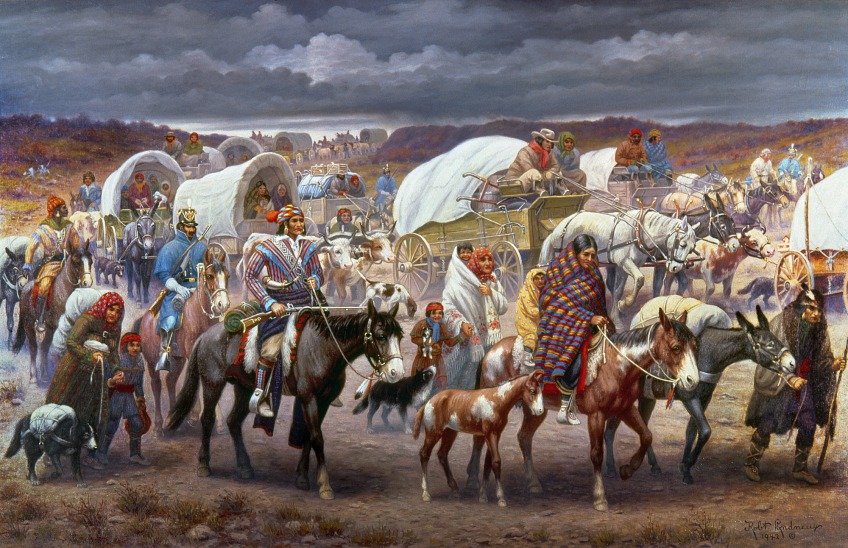
Later in the same paper, the story is continued.
It will be recollected by some of our readers that a few weeks since information was received here, that a party of Creek Indians, under their chief Tuck-e-batch-i-hard-jo had made a stand a few miles west of Potts’―and after remaining there a longer time than was necessary for them to recquit (?), were ordered away on their march, by Mr. Potts which they peremptorily refused―saying they were west of the Mississippi, and it was not in the power of any one to compel them to go on. They said the threats of the whites might alarm little boys―but they were men! Intelligence being conveyed to Col Teevault, commandant of the Pope (?) county militia, of the audacious language held by this chief, he, by authority of two proclamations issued by the Governor of the State on the 22nd October and 6th December, dated December 26th on the companies of his regiment, for an armed force; and in two or three days, upwards of 100 mounted men under arms for a forcible expulsion. But they were not needed―the Indians getting wind of the movement, decamped in the night about the 1st of January, and made a precipitate flight.
This circumstance (unimportant of itself) has been noticed by us, merely for the example it affords―and as affording another proof of the promptness of our militia, when called to duty.―Arkansas Gazette
——-
Late accounts represent the Lower Creeks in a hostile attitude. A number of them it is said have deserted Lieut. Sloan’s camp, and numbers are also daily returning from Florida and other parts to the Creek Nation. If these accounts are true, more trouble may be expected the ensuing Spring.
1Encyclopedia of Alabama
SOURCES
- Jacksonville Republican, Calhoun County, Alabama, February 1837
- Encyclopedia of Alabama
ALABAMA FOOTPRINTS Confrontation: Lost & Forgotten Stories (Volume 4)
Stories include:
- Tecumseh Causes Earthquake
- Terrified Settlers Abandon Farms
- Survivor Stories From Fort Mims Massacre
- Hillabee Massacre
- Threat of Starvation Men Turn To Mutiny
- Red Eagle After The War


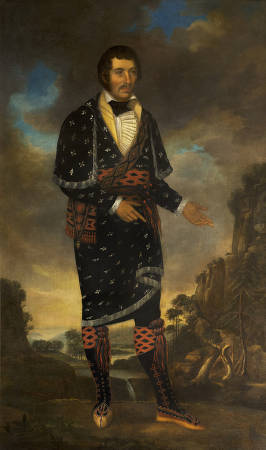
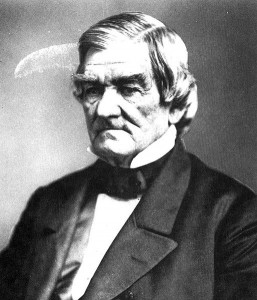
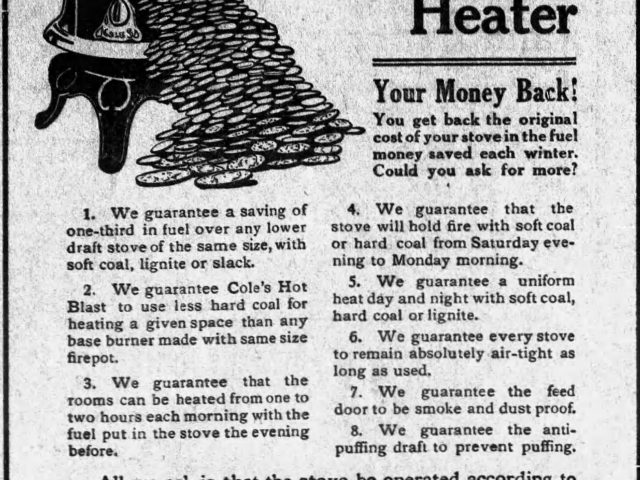
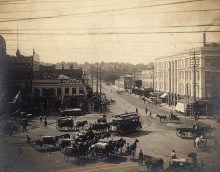
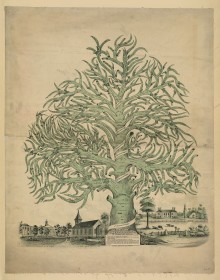
I believe my Indian blood is Creek.
Our country treated them terribly wrong. It makes me sad each time I read it.
Erin Cheek Robbins
They got screwed…
So wrong ..
One things about this tragedy can be corrected — the punctuation. Change to: Creeks’ or Removal of Creeks.
Thanks for catching that, typos get through every so often.
We as a people should be so ashamed by the way another human being was treated. It is a really sad account. The whites just wiped the Indian out. Orders by Grant.
The harm was eminence.
My gr8 gr8 grandmother was full blooded creek! Married John Winslett my gr8 gr8 grandfather! Went to Oklahoma on the trail of tears!
one of my ggggg grandmothers was cherokee but the family claimed to be black to not be forced into OK
Is this John Carson Winslett and Hattie Ward?
IMAGE CREDIT: Alabama Department of Archives and Historyhttp://digital.archives.alabama.gov/cdm/ref/collection/photo/id/20032
Rachel thanks for catching that, we updated the article. We strive hard to credit all images etc. where applicable. As you can see on our site we have and will continue to provide multitude of links to the Alabama Archives. We are always sharing and hopefully creating more awareness of the treasures that they hold and preserve. With Alabama Pioneers being a labor love of just one person perfection is our goal but I miss sometimes.
Thank you. I know you do. It is crucial, now more than ever, to make everyone aware of how much we get from our archival sources everyday and of the precarious state our historic treasures are in now because of state funding and organizational changes that will affect the Alabama Historical Commission and the ADAH. One way is to join this group: https://www.facebook.com/groups/AlabamaHistoryAdvocacy/
All Indian tribes suffered a similar fate as the white man move across America.
The bible tell us that we shall reap what we sow. Believing in this, we as the white race, will surely suffer. Question is, from whom or what race will our suffering be delivered.
This is interesting. My great great grandmother we believe was Creek. All we know is she married my great great grandfather General Garner. We have not be able to find any record…just word of mouth from my Dad’s family the Jones.
My paternal Great Grandmother, Emeline Robbins Mitchell (1826-1909), told a granddaughter that “she
remembered when they ran the Indians away and took that land in Coosa County”.
My family are from around Walker County, Parish , and Jasper Alabama.
Thank you for this important coverage. With so many places in Alabama that still bear the name of the indigenous tribes, it is important that their history and contribution to the culture, craft, and economy of the region be recognized and appreciated. They were the original “pioneers.”
Thought I was native American, but DNA says none at all. Everyone wants to be but few are. Go to a reservation and see if you really want to be. Whites are still very ignorant of the way they were treated and are still treated. It’s a shame so many know so little. I’ve had a relationship with the Dine’, Spanish Navajo,for forty years and have raised food help with them because the need is so huge. Stop the bull and go learn.
Jackson hated all Indians and British people
yes, I believe Jackson did hate all Indians..I do not know about the British, tho… Have you ever been to Cherokee, N.C. ? we were there in 2002, and stayed on the reservation for a week, going through the Eastern Band of Cherokee Nations Council House, and the records they have there….looking for a relative of my husband’s…..couldn’t find her, but I did find an answer to why…. some of the Indians went to hide in the hills……and Jackson couldn’t find them and put them on the TRAIL of TEARS….. while we were there, we watched UNTO THESE HILLS, the story of the trail of tears……this was the most moving play we have ever seen !!!!! it is held there in the spring/summer months…..If you ever go there to Cherokee, N.C. PLEASE go to see that outdoor play…. This story can ONLY be told there on the reservation, I believe…..wonderful !!!!!!..
Interesting….as a Creek…I’m not a member of a ‘group’…..I’m a ‘national’ of a nation of people….nuf-said
Only 1/16 Cherokee but the blood of my Cherokee descendants runs in my veins.
My earliest Cherokee kin was Kah-nung-da-tia-geh aka Ridge (White translation)
His log house remains until today and has continuously been occupied.
He is found on the 1835 census of Indians in North Carolina. (BRASSTOWN)
His son Thomas served with Jackson at the Horseshoe and later as one of Jacksons Bodyguards at Fort Jackson.
I took my father to Brasstown in 1998 and to the house without any knowledge of his kinship to its original occupant.
When he went inside he said ” I have been here before” Knowing that he had never been there I inquired ” You have never been here” He replied ” My spirit lives here” The current owner said the University had a Cherokee from Oklahoma who had the same reaction when he entered the house.
Do you believe some of our elders can feel the spirits of their elders?
John Ridge Quote:
Cherokee blood, if not destroyed, will win its courses in beings of fair complexion, who will read that their ancestors became civilized under the frowns of misfortune, and the causes of their enemies.
John Ridge was the son of Chief Major Ridge, He was educated and had a white wife.
At the time of the removal the Cherokee Nation was ruled by Half breed or less.
John Ross was 1/8, The Fields families were down to 1/8 to 1/4, as were the Hicks, Adairs, Buffingtons,and Thompsons.
THERE WAS NO REASON FOR THE TRAIL OF TEARS.
Alabama had a large Cherokee Population.
They had villages at WILLSTOWN, Chief Redhead Wills, LOOKOUT MOUNTAIN, Chief John Brown, CENTRE Chief Pathkiller, GUNTERSVILLE The Gunter Brothers, to name a few.
Chief Brown, Pathkiller, and the Gunter brothers had ferries on the Coosa and Tennessee rivers.
The Buffington, Fields, and Thompsons were fur traders.
The Adairs storekeepers.
GREED WAS THE REASON FOR REMOVAL. Why would a Georgean want to relocate a going business when he could take one from a Indian?
Chief Menawa was my Granfather 7 generations back. 🙂
The Indians written about here behaved about the same as current Alabamans would if the Government was pushing them from their homes.
And we had the right to take their land why?
Because at the time, the most powerful prevailed. You can’t judge with current eyes.
If it will make you feel better, you can quitclaim your property back to the Creek Indians: Poarch Band of Creek Indians
5811 Jack Springs Road
Atmore, AL 36502
Amelia Carlton Brigneti they had been taking it from one another for thousands of years- don’t get all broken up about it. And “we” was a dozen generations ago- don’t impose our moral values of today upon a totally different and less enlightened people.
Amelia Carlton Brigneti spoils of war,it has happened since the dawn of time
It wasn’t lost it was stolen
Just read about William Weatherford, better known as “Red Eagle”, a Creek leader, foe and later a friend of Andrew Jackson, a planter and owner of many slaves. Yes, some American Indians owned slaves. Furthermore, if one was a landowner in the 1830s he/she was not forced to leave and relocate to what is now Oklahoma. They could stay.
History is not always as simple as we’d like it to be.
Jim Hardaway or as the liberals would like us to believe.